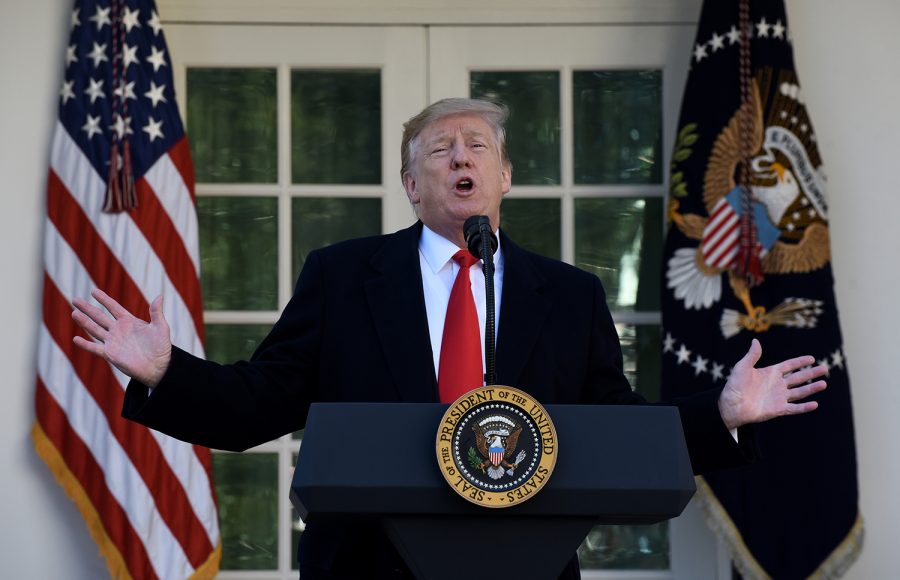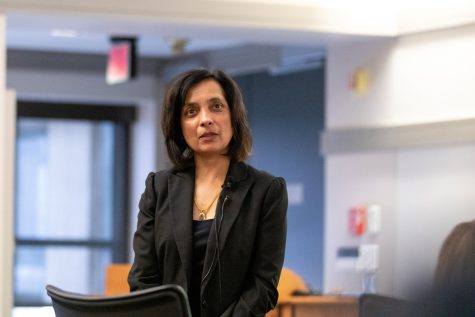Trump promises executive order addressing university speech
Universities are responding to President Trump’s promise of an executive order that would revoke research funding from colleges that seem not to embrace free speech on campus.
(Olivier Douliery/Abaca Press/TNS)
March 8, 2019
President Trump announced on March 2 his intention to invoke an executive order that would strip colleges and universities of federal funding for research depending on their support of free speech on campus.
The potential executive order comes amid free-speech concerns on the University of Iowa campus. Students have alleged facing discrimination and mistreatment under #DoesUIowaLoveMe, prompting an examination of the university’s role in distinguishing between individuals’ First Amendment rights and students’ desires to feel safe and have their identities respected.
“The American way is to learn and listen or to not engage and move on,” UI President Bruce Harreld told The Daily Iowan Thursday. “You shouldn’t equate the university’s allowing various groups to say what they’d like to say, hopefully in a constructive way, as our supporting one or the other.”
RELATED: As First Amendment debate surges at UI, Tinkers push for free speech
Harreld said until Trump elaborates on his intentions, and only if and when the executive order gets signed, there’s not much to comment on. He said he anticipates such a move would be met with a battle in the judicial system just as with many of Trump’s other executive orders.
“I think it’d be very unfortunate,” Harreld said. “Maybe it’ll happen, but let’s focus our energy on what is right now.”
Trump’s promise is a likely a response to recent skepticism surrounding universities across the nation, where right-leaning students may feel that higher-education officials have discriminated against their viewpoints.
“Conservative Republicans have felt for a long time that their views, and therefore their speech, are more encumbered on university campuses,” said UI School of Journalism Director David Ryfe, who teaches the Freedom of Expression course. “My guess is that this announcement by the president is speaking to that perception.”
Ryfe said all public institutions are required to abide by the First Amendment, and the rights it allows for are most imperative in public spaces on college campuses, such as the Pentacrest.
Courts largely oversee the application of the First Amendment on college campuses, Ryfe said. Trump’s proposal adds a layer of bureaucracy to that process, he said, so presumably someone in the executive branch would monitor free speech at universities.
Although the federal government making stipulations at state institutions by withholding federal money is nothing new, Ryfe said, it is unusual for the executive branch to insist on getting involved in First Amendment issues.
“That’s normally seen as a province of the courts,” Ryfe said. “So it’s a little unclear why the courts aren’t a venue that can properly ensure the freedom of expression on college campuses.”
He said the details of Trump’s unwritten policy are still very unclear, and depending on the language of the executive order, it won’t necessarily protect conservative speech at universities.
UI law Professor Christina Bohannan said the number of high-profile instances in which students claim discrimination against their speech are actually few and far between.
“In terms of state universities, I think they already try really hard to respect free speech, not only because of the Constitution but also as part of their own education,” she said. “We have to expose students to a lot of different viewpoints.”
The premise behind the First Amendment is that it is a neutral law, she said, so it applies to and protects all different kinds of ideas and issues. On college campuses, she said, it should encourage students to engage in debate by doing research to support their arguments.
Whether the executive order is written into policy, Bohannan said, she believes it would be helpful for universities to more broadly educate students on what the First Amendment means, why it’s important, and why the university has an obligation to protect it.
“We don’t have government picking and choosing what speech is allowed and what is prohibited,” Bohannan said. “We have a lot of very passionate students who are in college today, and they should learn that the First Amendment is there to allow them to speak truth to power.”





















